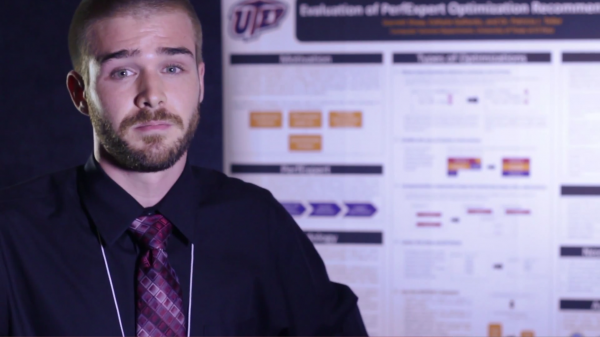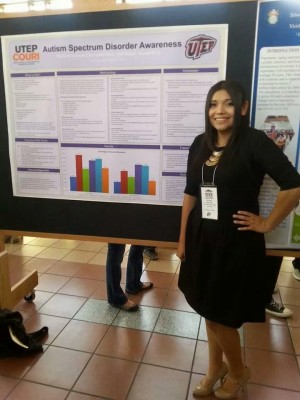EL PASO – Computer science and special education majors do not normally meet to discuss each other’s research, but Amanda Sepulveda and Garrett Shaw met throughout the spring 2014 semester to share research in preparation for a competition funded by the Campus Office of Undergraduate Research Initiatives (COURI).
Sepulveda is a special education major researching autism spectrum disorder, and Shaw is a computer science major researching optimization of high performance computing. They made up the winning team among the 50 that competed in COURI’s, “Explaining Research to a Non-Expert Audience” competition April 16-17.
The competition was a prelude to a two-day undergraduate research symposium hosted by COURI that gave undergraduates the chance to present and discuss their research with faculty, peers, and the El Paso community.
COURI was founded to help engage undergraduates in scholarly research. The purpose of the competition was to prepare students to present their research to audiences that may not be familiar with the jargon normally used in each field.
Garrett Shaw, ERNEA Team winner. Photo credit: Christy Ruby
Students were divided into teams of two — each from a completely different discipline — and each had to present and explain their teammate’s research in two minutes. First place and honorable mention were given to a student in each category. The success of the teams in the competition was based on the student’s ability to explain their research to their partners as well as to the audience.
Research topics ranged from education to biomedical advances to super computer data processing.
The abstracts for these projects were complicated, however, as the symposium opened up and the posters with the research findings were displayed in the lobby, the majority of the audience did not question the basic premise of the research.
Getting paid to do research in an academic field is not an opportunity often given to undergraduates at many universities. However, COURI provides compensation to undergraduate students who do research in their field.
The students are given an opportunity to conduct their research with an expert mentor and a supervisor.
Nicole Sepulveda, ERNEA Team winner, said that the possibility of making a difference in her field was her motivation to do research. Photo credit: Christy Ruby
“The idea behind this competition is to try to teach students how to explain their research to others [such as] politicians and policy makers, who might not be experts in that field,” said COURI director Lourdes Echegoyen, Ph.D.
“One of the things that interested me in research was the possibility of making a difference in my field,” Sepulveda said.
For Shaw, the competition helped him step back from the research and think about it in layman’s terms.
“We communicated well and we really did sit down beforehand and discuss the main points we needed to hit,” Shaw said about his interaction with Sepulveda.” It is difficult to avoid getting caught up in the research and this competition helped me explain exactly what I do in layman’s terms, so everyone can understand.”
Sepulveda said that this opportunity forced her to ask and answer some important questions about her research.”Why would the general public care… why is my research important to the world?”
The answers to these questions led to a better understanding of her topic and a more universal appeal and applicability to her research.
Echegoyen said she was pleased with the way the competition turned out.
”I was very happy with how well all the students handled their presentations,” she said in the final COURI awards ceremony April 26. “I know it is not easy doing this, but the payoff is well worth the effort every one of you put in.”
The 2014 COURI Symposium marked the first time all university colleagues and schools were represented. Guest speakers included Rob La Frenais, Ph. D., noted critic and curator of The Arts Catalyst; UTEP Professor of Chemistry, Luis Echegoyen, Ph. D.; and Herb Childress, Ph. D., co-founder and director of Metaphor at Teleidoscope Group, a consulting firm on higher education, design, community development, consumer behavior and attitudes, and communications.
There are currently plans for another symposium in the summer at UTEP.

